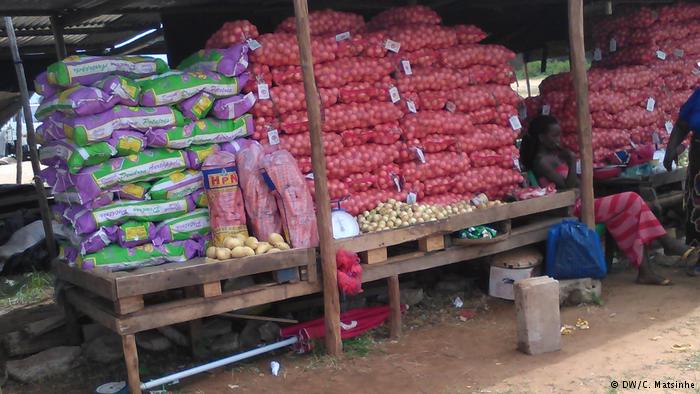Mozambique: Standard Bank believes resumption of LNG project will improve business confidence - AIM ...
Many complaints of “exorbitant prices” in Gaza, Mozambique

DW / Xai-Xai market
The rise in basic food prices in Xai-Xai, capital of Gaza province, is overwhelming residents while the authorities look impassively on, runs one of the most frequently heard complaints in the city.
The number of families forced by their reduced purchasing power to “tighten their belt” has been climbing relentlessly in the province in recent months.
People complain that, among other commodities, rice, oil and beans are increasingly expensive. Prices rise almost daily, forcing citizens to redouble their efforts to survive at a time when the metical continues to depreciate against the US dollar.
According to observers, poor agricultural production because of climatic issues, coupled with the political and military tension in the country, are among the factors contributing to the high price of foodstuffs.
Consumers and merchants in despair
DW Africa visited the wholesale market in the city of Xai-Xai to see how merchants and customers live with the situation.
Forty-seven-year-old shopper Raquell Dengo says that her shopping list has shrunk along with her purchasing power.
“I bought what I was able to buy, because prices do not allow you to buy everything you need. It’s just fine-tuning the scales back at home; we have to cut back on things.” She gives an example: “A bag of potatoes that cost US3 a week ago has gone up to US$4.5.”

On her way out of a store, Lariza Langa, 32 years old and shopping for a household of three, says the rise in prices is “worrying”. “It really affects me,” she says. “I’m doing all I can to cut back. I’ve had to give up lots of things.”
According to Lariza, the US$54 she has to spend every month – a little more than a minimum wage in Mozambique – “is not enough for anything”.
In the Limpopo retail market in the same city, chicken salesman Alberto Cumbe says that once he used to sell 50 chickens a day. Now he’s down to two on average. “All due to the rising cost of feed.”
Alberto says that now he has to sell chickens for about three dollars to make any money. “A lot of customers try to buy, but end up giving up because prices are so high.”
Passive authorities
As far as Anastacio Matavel, Executive Director of the Forum of Non-Governmental Organisations of Gaza (FONGA) is concerned, the constant increase in prices shows a lack of control and inspection of the commercial activity. “The state has completely resigned its social responsibilities,” he says.
“Our Government increases prices without talking to the sellers or buyers. I think it’s worrying, and a situation that cannot continue,” he says.
Lina Muchave, delegate of the National Inspectorate of Economic Activities (INAE) in Gaza, told DW Africa that consumers have no reason to complain because her institution has not detected any speculation.
A 20 percent profit margin is within normal parameters, Muchave says. “This is not speculation. Speculation would be selling products for prices not established by law. “













Leave a Reply
Be the First to Comment!
You must be logged in to post a comment.
You must be logged in to post a comment.